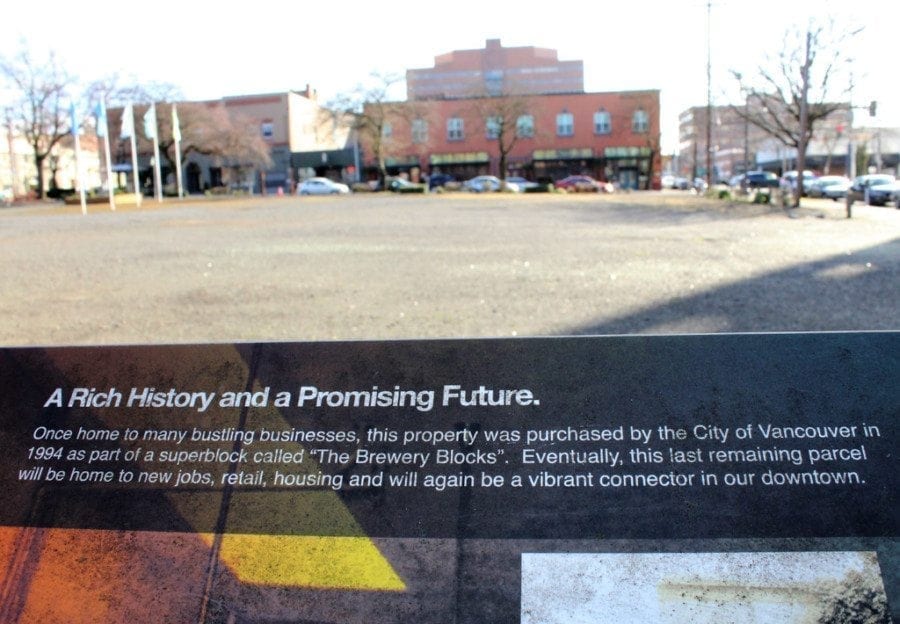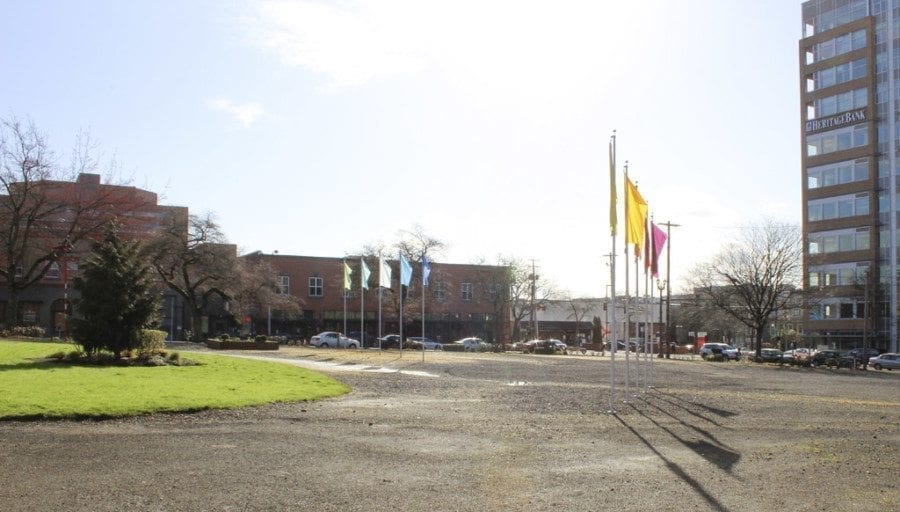VANCOUVER — A long-vacant piece of prime real estate in Vancouver’s core could soon become a mixed-use development with a grocery store, 250 residential units and ground-floor retail shops.
Located at the corner of 8th and Washington streets in downtown Vancouver, the 1-acre city-owned parcel known as “Block 10” used to be the site of the Lucky Lager Brewery, which closed in 1985. The city purchased the property, along with four other former Lucky Lager parcels, in 1994 for $2 million.
All of the other downtown “Brewery Blocks” have since been developed, but Block 10 remained a vacant gravel lot until 2012, when the Vancouver Downtown Association raised funds to install flowerbeds, shrubberies, paths, historical signs and flagpoles, creating the temporary Heritage Square.

At a meeting held Mon., March 13, Vancouver City Council members heard that the vacant lot has recently garnered serious attention from several potential developers.
“(Block 10) has been in the city’s hands for about 20 years and we’ve seen a lot of changes in those 20 years,” Vancouver City Manager Eric Holmes told Vancouver City Council members at the March 13 work session, adding that he was pleased to see developers take an interest in the vacant downtown site.
Although the city’s 2014 request for proposals to develop Block 10 came back empty-handed, this year’s request drew interest from a few potential developers, said Teresa Brum, economic development division manager for the city of Vancouver.
“We had three proposals,” Brum told city council members at the March 13 meeting. “One was withdrawn by the applicant. … (But) we received two very exciting proposals with elements that would be great for downtown.”
City staff considered both proposals for the Block 10 site, interviewing the developers and scoring the projects on how well they met the criteria for the city’s downtown development vision.
One proposal, from LSW Architects, would have built a 237,000-square-foot mixed-use project with retail shops, office space, an early learning center, community space, a business innovation center and a K-5 urban school of arts and innovation for Vancouver Public Schools.
While city staff agreed that the LSW proposal sounded like a good fit for the downtown area, a second proposal from Vancouver’s Waterfront developer, Gramor Development, proved to be a better match for the city’s listed criteria.
“Gramor received the highest rankings from the review committee,” said Linda Carlson, the city’s property management specialist.
The Gramor proposal could bring a long-awaited grocery store to Vancouver’s downtown, along with a 220,000-square-foot mixed use building that would host 250 studio and one-bedroom apartments, additional ground-level retail shops and underground as well as aboveground parking.

City staff recommended to the city council that they enter into negotiations with Gramor Development and also try to help LSW Architects find a downtown space that might work for the developers’ K-5 school/community space project.
“These are definitely two strong proposals,” said City Council Member Alishia Topper, asking city staff if there was a way to ensure that Gramor Development would be required to include the proposed grocery store in their final project.
“Our city center vision plan calls for a grocery store downtown,” Holmes told the council members, adding that the issue could certainly be part of the city’s negotiations with Gramor Development. “I’m hearing a consensus to engage with Gramor, have an ironclad guarantee to have a grocery store in the development project, move as quickly (as the developer can) and also move forward with helping LSW find another space downtown.”
Mayor Tim Leavitt, who has long advocated for development of the city-owned Block 10 site, urged the city staff to make sure the Gramor project would be something that moved forward on an agreed-upon schedule and that resulted in an urban grocery store for downtown Vancouver.
“I want to see a bulletproof agreement between the city and the developer to ensure that the use and the schedule are agreed upon,” Leavitt said at the March 13 work session. “We’ve had some mixed results with other developers downtown with adhering to a schedule and I don’t think we want that to happen with something as important as Block 10.”
Leavitt added that he also didn’t want to get residents’ hopes up for a downtown grocery store and then have that piece of the proposal fall through.
For their part, Gramor Development is well-versed in negotiating with Vancouver and other Clark County jurisdictions. The developer has been creating mixed-use projects throughout southwest Washington and northwest Oregon since the mid-1980s, and has several grocery store-anchored developments in Clark County, including the QFC-anchored 162nd Place development built in 1999 off 162nd Avenue in Vancouver; the Safeway-anchored Orchards Plaza, developed in 1988 at 11500 NE 76th St., in Orchards; the Albertsons-anchored Battle Ground Market development built in 1999 on Battle Ground’s Main Street; and the 1994 Fisher’s Landing Marketplace project off Southeast 164th Avenue in Vancouver, which boasts a New Seasons Market.
Most recently, the developer has made headlines for their massive, $1.5 billion Waterfront project along Vancouver’s downtown waterfront, which, according to Gramor’s website, “encompasses 32 acres, 21 city blocks and a master plan that calls for up to 3,300 housing units, 10 park acres, 1.25 million feet of office space and 250,000 square feet of retail and hospitality space.”
Brun said the proposals for Block 10 show that the city’s downtown is a hot area for developers.
“We issued an RFP (request for proposals) in 2014 with no responses at that time,” Brun said. “That was not the case this time. Now we have exciting proposals to review … downtown is going through a rebirth that, I think, is unprecedented.”
Once the city staff has gone through the negotiation process with Gramor Development, they will bring the proposed development agreement back to the city council for a public hearing.




